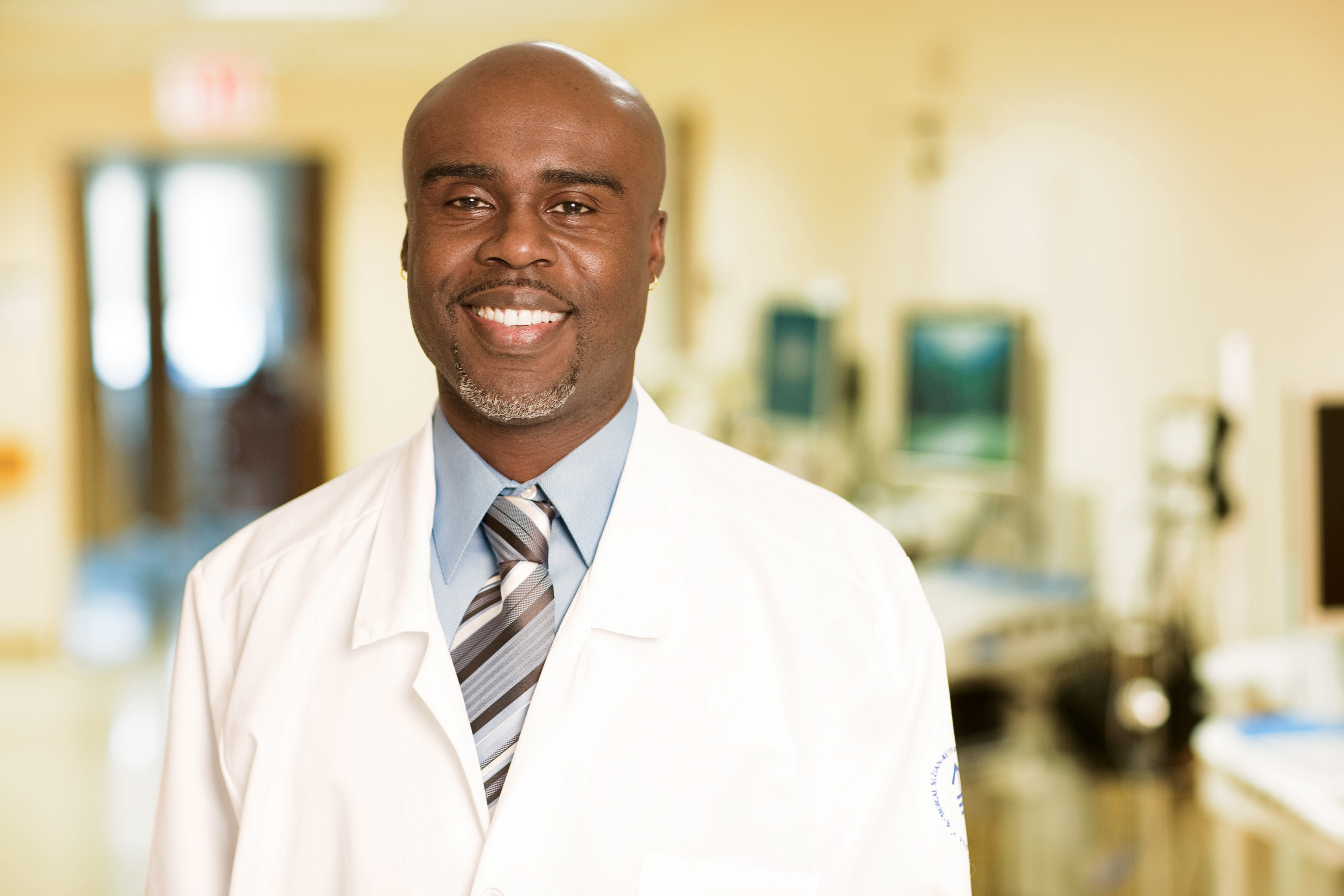Every day when he arrives at work, Wayne Quashie confronts the possibility of death. It lurks in the hallways and tiptoes into the rooms, a sepulchral presence that, with the slightest provocation, can latch onto a patient.
Quashie, a doctoral student at TC, is an oncology Clinical Nurse Specialist. For the last 20 years, he’s worked at Memorial Sloan-Kettering Cancer Center, a span during which he’s seen many patients make inspiring recoveries, thanks to enormous advances in treatments. He’s also seen many die, but he doesn’t lose faith.
“Death is inevitable for all of us,” he says. “I can’t stop patients from dying but I can definitely affect how comfortably they die. We help patients die well. That is the consolation we nurses get.”
“We see the beauty of family connections and how it helps patients cope with a disease that can end in joy or sorrow.”
Quashie also develops and trains new graduate nurses as they transition into their careers. In order to become a better teacher, he recently enrolled in TC’s Doctorate in Nursing Education program, supported by the Cynthia Davis Sculco Scholarship.
“I chose Teachers College because I truly believe this was the only place that I could develop the appropriate educational skills to usher in our future nurses,” he says.
An interview with Quashie follows.
Why are you passionate about nursing?
In oncology nursing, what is more important is the question of, ‘How do you maintain your passion for nursing and your compassion for your patients?’ Oncology nurses are constantly giving of themselves and eager to ensure the best care for our patients. Cancer is an extraordinary disease and upon diagnosis everything ceases to be ordinary for the patient and for their loved ones. It is a period of uncertainty and a journey of highs and lows. How does an oncology nurse deal with this experience? Most importantly, we see the beauty of family connections and how it helps patients cope with a disease that can end in joy or sorrow. In addition, the field of oncology is changing rapidly, patients are living longer due to new treatments and cancer research continues to evolve at an astounding rate as we try to create a world without cancer.
Where do you suspect you got your sense of compassion?
I think my life experience with my parents aided in developing compassion for others. In addition, my Christian faith has been instrumental in keeping me grounded and concerned for others. I don’t believe one can say one is a Christian or compassionate while being accepting of social injustices in society. Being “okay” with inequities in healthcare, education or any other social disenfranchisement is antithetical to being compassionate.
“Each day when I arrive at work, I’m constantly reminded that there is an entire hospital filled with patients with greater challenges than I.”
What do you hope to learn at TC?
I’ve been an oncology nurse for 20 years, but I still have questions. How do we (nurses working in the clinical environment) ease the transition for student nurses who become professional nurses? How do educators help them develop the skills they need to care for acutely ill patients in a highly technical environment? How do I assist a nurse with limited life experience to connect with patients and families facing the unknown of a cancer diagnosis? The answers to these questions are essential to the nursing profession and to nursing education and these are the questions I’m probing at TC.
How do you unwind from work?
It’s essential to have a life outside of work and appreciate the important things (family, life, health, etc.) that life gives us. Enjoy your family, enjoy your connections to your loves ones. One thing every oncology nurse learns is that nothing in life, especially your health, should be taken for granted. Recently, I cared for a young man - he was just 22-years old -- who had experienced back pain. At 22, you don’t think you will get cancer, but that was his fate. He was diagnosed with widely metastatic cancer. There are not many 22-year olds thinking that death awaits them, yet he and his parents had to face that stark reality. And shortly after he was diagnosed, he died. Experiences like that make you appreciative of life. You tend to complain less and you appreciate all the opportunities you have to live well and enjoy life. Each day when I arrive at work, I’m constantly reminded that there is an entire hospital filled with patients with greater challenges than I.
You were born in Trinidad. Can you talk about your background?
I migrated to this country with my mom and sister at the age of 19 after my father’s death. I attained a nursing degree from Hunter College. I did not receive financial aid for nursing school so I worked part time while in school. My mom worked three jobs (school secretary and two retail jobs) as we acclimated to our new home. Watching her work so many jobs, I made a promise to myself: that I’d go to college and start a career that I love.
Teachers College recently gave you the Cynthia Davis Sculco Scholarship. Is that helping you financially?
I attended Columbia for my master’s in public health, so I was aware of the cost. I did not have a plan on how I’d finance my doctoral education at TC. I filled out the application and hoped for the best. I thought to myself, “if I get in and can’t pay, I won’t go.” I decided that I’d forego my dream if I was unable to finance my education. So when I received notification of being a recipient of the Cynthia Davis Sculco Scholarship, I was ecstatic. It provided an avenue for me to start my pursuit of my doctorate. I am really grateful to TC and its generous benefactors, who are helping many students like me to realize our educational goals.
